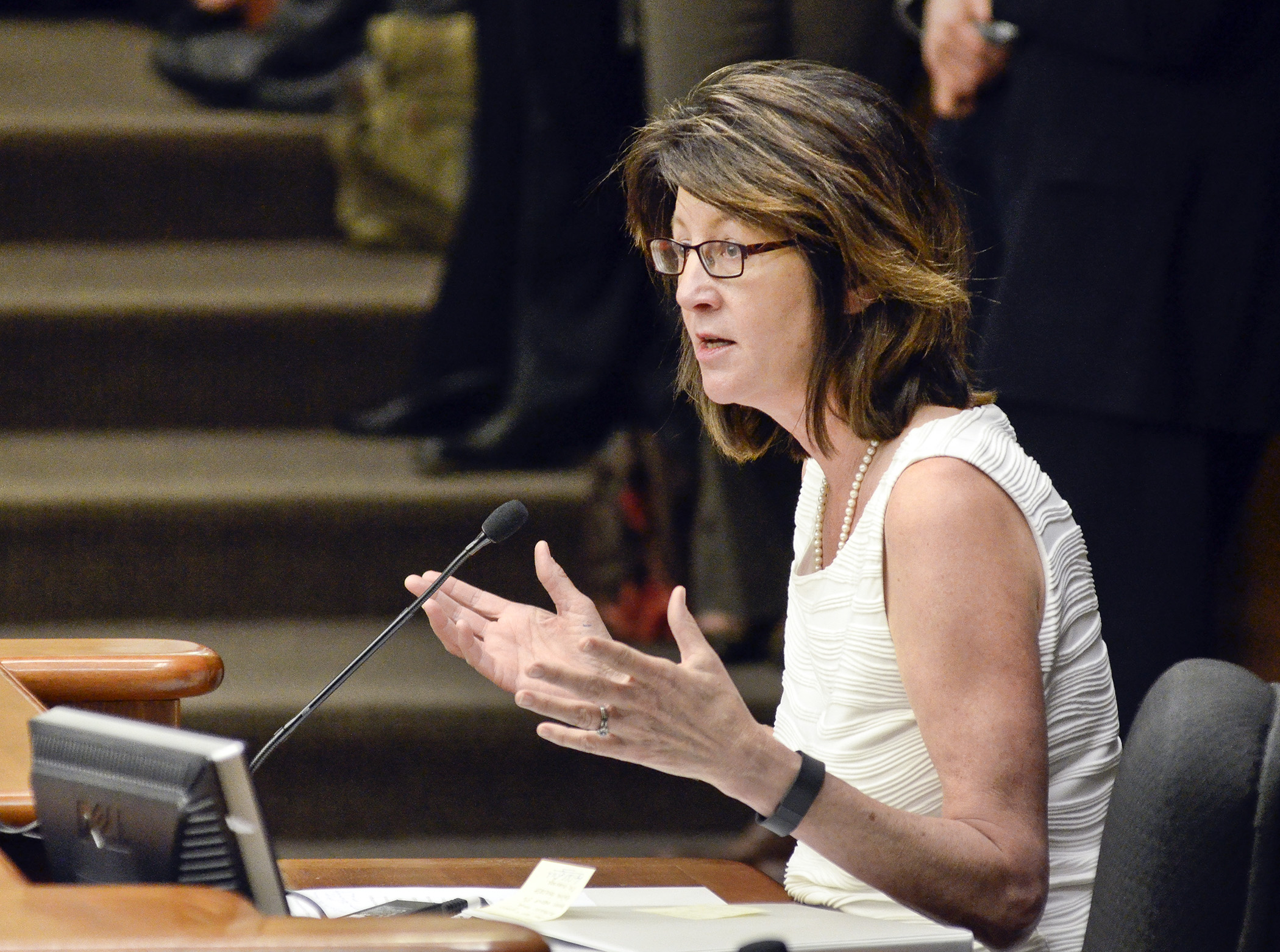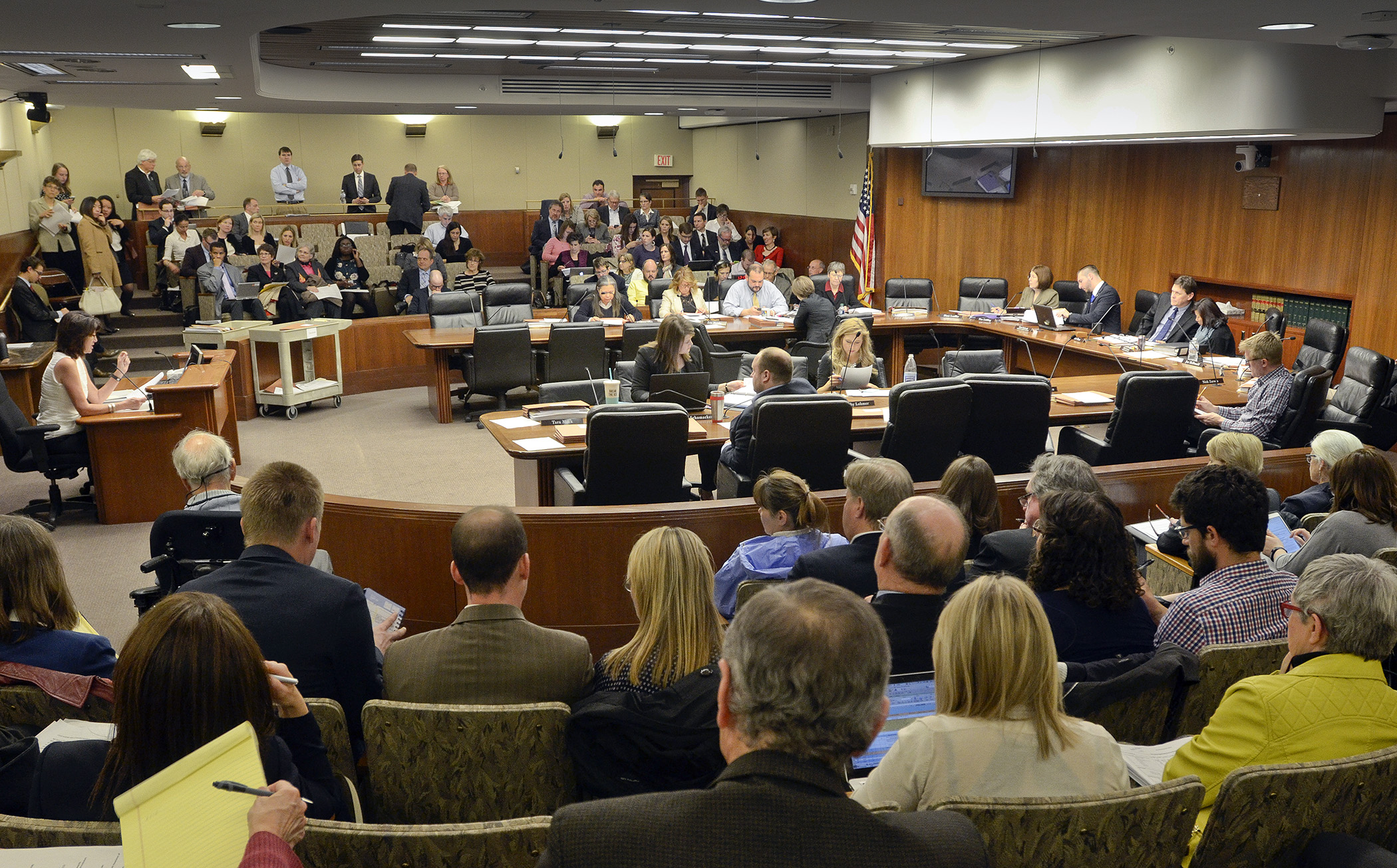Amended omnibus health and human services finance bill gets committee OK

UPDATED AT 10:13 P.M. TO REFLECT COMMITTEE ACTION
On an 11-7 party-line, roll-call vote, the House Health and Human Services Finance Committee approved the omnibus health and human services finance bill Monday night after attaching a few amendments.
Sponsored by the committee chair, Rep. Matt Dean (R-Dellwood), HF1638, as amended, moves to the House Ways and Means Committee. SF1458, a companion sponsored by Sen. Tony Lourey (DFL-Kerrick), is scheduled for a Tuesday hearing by the Senate Health, Human Services and Housing Committee.
Republican proposed spending on health care also received a booster shot Monday when an additional $139.66 million from the General Fund was approved in the next biennium by the House Ways and Means Committee. The overall omnibus health and human services finance bill would now spend $11.76 billion in combined funds.
Among the adopted amendments was one proposed by Rep. Tara Mack (R-Apple Valley) that would provide more flexibility for those who partner to provide telemedicine. The cost of the service could be negotiated rather than having the legislation dictate who pays.
A couple of adopted amendments carried provisions to continue or expand programs within available funds of their departments, such as the Family Assets for Independence in Minnesota program and allowing licensed physician assistants who complete 2,000 hours of clinical experience to work in underserved areas.
MORE: Session Daily coverage of HF1638
Final public testimony offered Monday afternoon on HF1638 both praised and criticized the bill.
Supporters say the bill would increase Medical Assistance payments to many health care facilities, and result in higher wages for low-wage earners.
Kari Thurlow, senior vice president of advocacy at Leading Age, said the reimbursement reform for nursing homes and 5 percent increase for workers would be a great step forward in helping seniors stay at home, access care in their communities and fund quality care.
“This bill is a step in the right direction,” Thurlow said.
However, the budget plan is contingent upon several savings proposals, such as federal approval to allow subsidies for insurance plans purchased outside of MNsure, the state’s health insurance exchange. It also is based on the Department of Human Services’ capacity to recover $300 million by stopping fraud and removing ineligible recipients from the welfare rolls. Aggressive competitive bidding by DHS is another anticipated cost cutting measure.
Human Services Commissioner Lucinda Jesson said the plan is based on unsupported financial analysis and she fears, if implemented, would put the department on a path for future deficits. She acknowledged there are many good spending proposals in the plan, “but it is good spending based on phantom savings.”
 With the majority of hearing room seats occupied, the House Health and Human Services Finance Committee listens to public testimony on the omnibus health and human services finance bill April 20. Photo by Andrew VonBank
With the majority of hearing room seats occupied, the House Health and Human Services Finance Committee listens to public testimony on the omnibus health and human services finance bill April 20. Photo by Andrew VonBankA 15 percent reduction to administrative staff is in the bill, which the commissioner said would reduce oversight.
“You need to tell us in law what you want us to stop doing,” Jesson said.
Following a rocky rollout of MNsure, the bill would move MNsure clients to the federal exchange and repeal Minnesota Care in exchange for a new methodology. Jesson said the state is “making slow, but steady progress” and starting over with a new public health care insurance program would be a step backward.
Dean said MNsure is not working and Minnesota Care is not sustainable under its current funding formula. Gov. Mark Dayton has proposed a task force to study the viability of the programs, a process Jesson preferred over full repeal.
“There’s a lot of frustration in those two programs,” Dean said.
But former Minnesota Management & Budget Commissioner Jim Schowalter, who is now Minnesota Council of Health Plans president and CEO, said that while controlling costs is laudable, the bill’s impact would be contrary to Republican expectations.
“Implementation of a new program will not be simple and will lock in uncertainty for many more years,” Schowalter said. “I understand the turmoil, but it’s not a time to jump to a substantially different model.”
Schowalter also opposed a plan to shift $130 million in health plan payments from this biennium to the next, a practice he said should be reserved for tough times, and not when the state is facing a projected surplus.
”Our budget asks an incredibly big lift from the plans, we understand that,” Dean responded, adding that Minnesotans need a more dependable and sustainable health plan.
Health Commissioner Ed Ehlinger disagreed, saying the deferred investments, cuts in local government grants and administrative cuts would lead the state down “a path to mediocrity.”
Related Articles
Search Session Daily
Advanced Search OptionsPriority Dailies
Ways and Means Committee OKs proposed $512 million supplemental budget on party-line vote
By Mike Cook Meeting more needs or fiscal irresponsibility is one way to sum up the differences among the two parties on a supplemental spending package a year after a $72 billion state budg...
Meeting more needs or fiscal irresponsibility is one way to sum up the differences among the two parties on a supplemental spending package a year after a $72 billion state budg...
Minnesota’s projected budget surplus balloons to $3.7 billion, but fiscal pressure still looms
By Rob Hubbard Just as Minnesota has experienced a warmer winter than usual, so has the state’s budget outlook warmed over the past few months.
On Thursday, Minnesota Management and Budget...
Just as Minnesota has experienced a warmer winter than usual, so has the state’s budget outlook warmed over the past few months.
On Thursday, Minnesota Management and Budget...